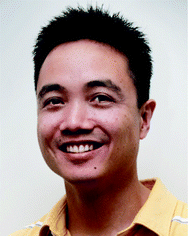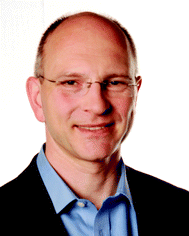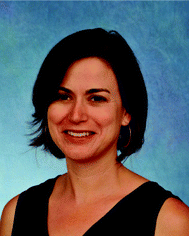DOI: 10.1039/C2LC90147A
(Profile)
Lab Chip, 2013, 13, 494-497
Neuroengineering contributors 2012
Anil Achyuta
Anil Achyuta is a senior member of technical staff at The Charles Stark Draper Laboratory Inc., a not-for-profit organization in Cambridge, MA. He received his PhD in Chemical Engineering under Dr Shashi Murthy's academic guidance at Northeastern University in Boston. His doctoral research emphasized developing novel bioactive and biopassive coatings for neural implants. Upon starting at Draper, Dr Achyuta leveraged his prior knowledge about neural tissue response to foreign objects to design biomimetic microfabricated models of the brain. His current interests include central and peripheral nervous system injury and regeneration, neuroprosthetics, microfluidic biosensors, organ-on-a-chip platforms and clinical biomaterials.
Santiago Costantino
Santiago Costantino received his PhD in ultrafast lasers from the Physics Department of the University of Buenos Aires, under the supervision of Oscar E. Martínez, in 2003. He moved to Canada for his postdoctoral training in microscopy and neuroscience at McGill University. He established his biophotonics lab at the Maisonneuve-Rosemont Hospital, Montreal University, in 2007. He is now an assistant professor and his current research spans microengineering, image analysis and the development of medical tools for vision health. In 2009 he received a career award from the FRQS. He is married to Claudia and has two wonderful children, Manuela and Tomás.
Albert Folch
Albert Folch was born in Barcelona (Catalonia, Spain) in 1966. He received his BSc in Physics from the University of Barcelona in 1989. In 1994, he received his PhD in Surface Science and Nanotechnology from the U.B.'s Physics Dept. (Dr Javier Tejada). From 1994–1996, he was a postdoc at M.I.T. developing microdevices (Martin A. Schmidt and Mark S. Wrighton). In 1997, he joined Dr Mehmet Toner's laboratory as a postdoc at Harvard. In 2000 he joined the University of Washington's Dept. of Bioengineering (Seattle), where he is presently an Associate Professor. In 2001 he received a NSF CAREER Award. He serves on the Advisory Board of Lab on a Chip.
Thibault Honegger
Thibault Honegger received his Engineering diploma from the Ecole Centrale of Nantes, France in 2007, his MS and PhD degrees in NanoBioTechnologies and Electrical Engineering from the University of Grenoble, France, in 2008 and 2011. During his Ph.D. at LTM (CNRS-CEA), he developed electromicrofluidic platforms to perform cellular and sub-cellular 3D dielectrophoresis with smart colloidal particles. He joined the team of Prof. Voldman at MIT in 2012 as a post-doctoral associate and initiated the work on the electrokinetic confinement of axonal growth.
Elliot Hui
Elliot Hui received his doctoral training in MEMS under Roger Howe at UC Berkeley, followed by postdoctoral training in tissue engineering under Sangeeta Bhatia at MIT. In 2008, he joined the biomedical engineering faculty at the University of California, Irvine. His research interests include the role of spatial organization in cell–cell signaling; temporal dynamics in cells, tissues and small animals; and point-of-care diagnostics. To this end, he also pursues the engineering of microfabricated cell culture substrates; dynamically controlled biological microenvironments; and autonomous integrated microfluidics via microfluidic digital logic.
Noo Li Jeon
Prof. Noo Li Jeon earned his BS degree from Northwestern University in 1991 and obtained his PhD degree from University of Illinois, Urbana-Champaign in 1997. For his postdoctoral research, he moved to the Department of Chemistry at Harvard University and Department of Biomedical Engineering at Havard Medical School/Massachusetts General Hospital/Shriner’s Hospital. In 2001, he joined the faculty of the Department of Biomedical Engineering at University of California, Irvine. In 2009, he joined the faculty of the Mechanical and Aerospace Engineering at Seoul National University as an Associate Professor. His Research area includes microfabrication and development of bio-mimetic microfluidic platforms for neuroscience, angiogenesis and drug delivery systems.
Myoeng Woo Kang
Myeong Woo Kang is a PhD candidate in the school of Mechanical and Aerospace Engineering at Seoul National University. He received his Bachelor of Engineering in Mechanical Engineering at the Korea Advanced Institute of Science and Technology in 2010 and his Master of Engineering from the school of Mechanical and Aerospace Engineering at Seoul National University in 2012. His current research interests include development of micro- and nano-fabrication techniques and realization of an in vitro microfluidic neural network for understanding of functional connectomics of the brain.
Hyung Joon Kim
Hyung Joon Kim has been working with professor Fred H. Gage at The Salk Institute for Biological Studies as a postdoctoral fellow since 2010. He obtained his BS and MS degree in materials science and engineering from POSTECH, Korea in 1997 and 1999, respectively. After five years working in biomedical MEMS at Korea Institute of Science and Technology as a research scientist, he pursued his doctoral training under professor Noo Li Jeon at University of California, Irvine in 2010. His research focuses on cellular and molecular pathways in neurogenesis by manipulating embryonic and induced pluripotent stem cells in engineered platforms.
Ellis Meng
Ellis Meng received a BS degree in engineering and applied science and MS and PhD degrees in electrical engineering from the California Institute of Technology in 1997, 1998, and 2003, respectively. She is an Associate Professor in the Department of Biomedical Engineering and Ming Hsieh Department of Electrical Engineering, University of Southern California, where she has been since 2004. She has received the NSF CAREER award, Coulter Foundation Early Career Award and recognition as a TR35 Technology Review Young Innovators under 35. Her research interests include biomicroelectromechanical systems (bioMEMS), implantable biomedical microdevices, microfluidics, multimodality integrated microsystems and packaging.
Jae Woo Park
Jae Woo Park is a PhD candidate in the World Class University (WCU) Program of Multiscale Mechanical Design at Seoul National University. He received his BS degree in Applied Chemistry and Biological Engineering at Ajou University, Korea, in 2005. In 2009, he received his MS degree in Chemical and Biological Engineering at Seoul National University, Korea. His current research interests are the development of in vitro disease models including spinal cord injury, stroke and neurodegenerative disease.
Taher Saif
Dr Taher Saif received his BS and MS degrees in Civil Engineering from Bangladesh University of Engineering and Technology and Washington State University in 1984 and 1986, respectively. He obtained his PhD degree in Theoretical and Applied Mechanics from Cornell University in 1993. He worked as a Post Doctoral Associate in Electrical Engineering and the National Nanofabrication Facility at Cornell University during 1993–97. He joined the Department of Mechanical Science and Engineering at the University of Illinois at Urbana-Champaign during 1997. He is currently the Gutgsell Professor in the department. His current research includes mechanics of neurons and cardiac cells, development of biological machines and electro-thermo-mechanical behavior of nanoscale metals and semiconductors.
Mark Scott
Mark Scott received his BA and MEng degrees from the University of Cambridge, UK, in 2007. He was awarded a Kennedy Scholarship in 2007 and is now enrolled in the Harvard–MIT Program of Health Sciences and Technology. He is working as a graduate research assistant with Prof. Yanik at MIT and is pursuing a doctoral degree. His research includes femtosecond laser micropatterning of proteins to coordinate neurite outgrowth and neuron polarization.
Thomas Stieglitz
Thomas Stieglitz received a Dipl.-Ing. in electrical engineering in 1993 (TH Karlsruhe), a Dr-Ing. in 1998 and qualified as a university lecturer (Habilitation) in 2002 (both from the University of Saarland, Saarbruecken, Germany). From 1993 to 2004 he was with the Fraunhofer-Institute for Biomedical Engineering, St. Ingbert, Germany. Since October 2004, he is a full Professor of Biomedical Microtechnology at IMTEK-Department of Microsystems Engineering, Faculty of Engineering, at the University of Freiburg. In 2010 he co-founded the spin-off company CorTec, which develops and distributes brain machine interfaces. His research interests include biocompatible assembling and packaging, microimplants and neural prostheses.
Anne Marion Taylor
Anne Marion Taylor is an Assistant Professor of Biomedical Engineering at the UNC-Chapel Hill and North Carolina State University Joint Department of Biomedical Engineering. Her lab is based at UNC-Chapel Hill where she is also a member of the UNC Neuroscience Center. She performed her undergraduate training in Civil Engineering at Washington University in St Louis and is a Professional Engineer in the State of California. She changed trajectories slightly and obtained a PhD in Biomedical Engineering from UC Irvine in 2006 under the direction of Dr Noo Li Jeon and with close collaboration with Dr Carl Cotman. Her graduate work, supported by an NIH Ruth Kirschstein predoctoral fellowship, focused on developing micro-scale devices for novel applications in neurobiology. She received postdoctoral training at the California Institute of Technology under the direction of Dr Erin Schuman (currently a Director at the Max Planck Institute for Brain Research) where she studied synaptic plasticity using novel micro-scale approaches. She received a Johnson & Johnson postdoctoral scholarship while at Caltech. She is also a co-founder of Xona Microfluidics, LLC a company focused on making and distributing micro-scale devices for neuronal applications.
Joel Voldman
Joel Voldman received a BS degree in electrical engineering from the University of Massachusetts, Amherst, in 1995 and MS and PhD degrees in electrical engineering from the Massachusetts Institute of Technology (MIT), Cambridge, in 1997 and 2001. Following this, he was a postdoctoral associate at Harvard Medical School. Since 2002, he has been at MIT, where he is currently Associate Professor. His research interests include microscale manipulation of cells for cell sorting, dielectric cell analysis, and stem cell biology. Dr Voldman has received several awards, including an NSF CAREER award and the ACS Young Innovator Award.
Mehmet F. Yanik
Prof. Yanik received his BS and MS in Engineering and Physics at MIT in 2000, and PhD in Applied Physics at Stanford. He completed postdoctoral work in Stanford Bioengineering and Neurosurgery. He is currently Associate Professor at MIT Electrical and Biological Engineering Departments. His studies are recognized by a NIH Director's Pioneer Award, NIH Director's New Innovator Award, NIH Transformative Research Award, Packard Award in Engineering and Science, Alfred Sloan Award in Neuroscience, NIH Eureka Award, NSF Career Award, Silicon Valley's Innovator Award, Technology Review Magazine's “World's top 35 innovators under age 35” and Junior Chamber's “Outstanding Young Person”.
| This journal is © The Royal Society of Chemistry 2013 |
















